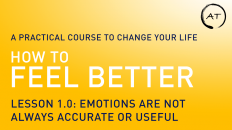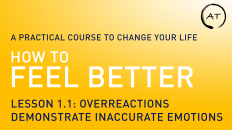Emotions are reactions to the past. It’s what they are. This means they may not always be appropriate.
Fortunately, emotions being reactions to the past isn’t a horrible problem by itself. They normally are somewhat accurate. (Though some constant reactions, like low self-worth, are extremely detrimental to quality of life.)
Sometimes emotions are wildly inappropriate, especially when they are reactions to incorrect assumptions. Basically, our mind is filling in the blanks of our experience. It makes assumptions around what is going on. Depending on your life experience, your mind may make good assumptions or bad assumptions.
Here’s a little story about just that:
Tommy is taking his two children on vacation in the United Kingdom. All three of them are so excited. His son wants to see Scotland Yard, and his daughter is most excited about a day trip to Oxford University. First stop after their flight lands is the rental car booth. Tommy gets a safe rental car to tote his kids around in. He’s really excited.
He gets into the driver’s seat of the car, which is on the right. Tommy thinks this is weird, be he has heard that cars were different in Britain.
He begins driving on the right side of the road towards the hotel. When he gets to the first stop sign, another car arrives a second later. Tommy stops completely, then proceeds. As he drives through the intersection, the other car furiously honks at Tommy. The other driver rolls down his window and yells something. “What a jerk!” Tommy says. Tommy got to the intersection first, of course Tommy should get to go first! Tommy is pissed off at the U.K. after less than an hour in the country.
Then he sees a car driving at him straight on. He honks. The other car honks. It’s a game of chicken. Who will stop?
Both cars end up stopping, and a Briton gets out of the other car. “Pardon me, but you appear to be driving on the wrong side of the road,” the man says politely. All of a sudden, it clicks for Tommy. In Britain you drive on the left side of the road. Thoroughly embarrassed, Tommy apologizes and thanks the man. He now realizes that the “jerk” from earlier was trying to help Tommy.
His anger came from reacting to an incorrect assumption about the “jerk’s” motive.
We all operate on assumptions. It’s part of life. This means that we are going to be wrong sometimes. Because emotions are reactions to the past, they tend to be based on the assumption the future will be like the past. But this isn’t always the case. In fact, much of the time, our assumptions from emotions are missing the mark.
When you experience a strong emotion, try to look at the present and at the assumptions you are making. Make sure you aren’t misinterpreting something. Your attitude can greatly change when you change your assumptions.
Misinterpretations and reactions to the past are only two tricks that our emotions play on us. A third, more devious trick, is when your emotions conflict with each other.


